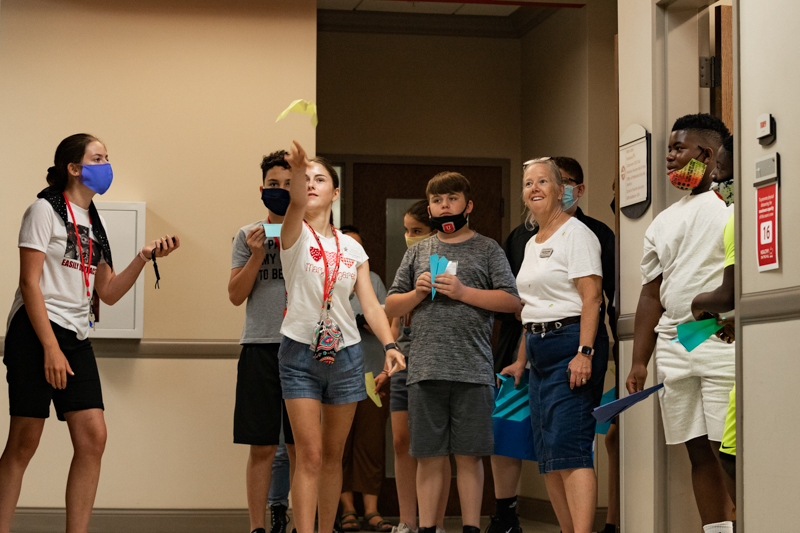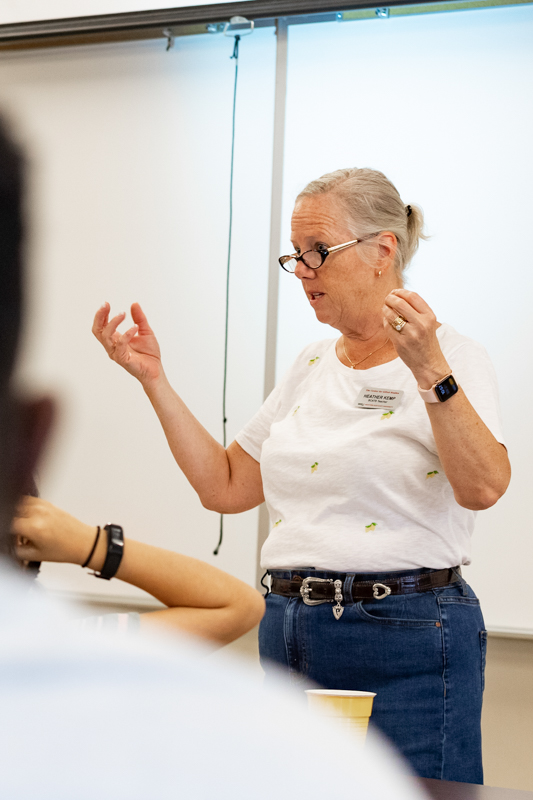by Erika Solberg
Veteran teacher Heather Kemp of Louisville knows how to get students launched into learning. Her SCATS class, 3-2-1 Blast Off, is all about rockets, and on the first day students were already exploring bodies in motion. Heather asked them to come up with their own explanations on Newton’s first law by writing a definition, making a drawing, or performing a skit. Kate Jarboe of Shepherdsville pushed a wheeled chair holding Adrika Saha of Newburgh, IN, across the front of the room, and then spun her friend around. The girls next explained the forces that had produced the movement. “What’s stopping Adrika from falling to the floor?” Heather asked as a follow-up.
Over the next two weeks, students will learn about the forces that cause objects to fly and rockets to move and will build and launch their own rockets made from two-liter bottles. Heather, who has taught fourth and fifth grade at Middletown Elementary in Middletown for 22 years but will switch to second grade this fall, is teaching at SCATS for her practicum experience. She is part of the second cohort earning the gifted endorsement through a partnership with The Center and Jefferson County Public Schools in Louisville. She and 39 colleagues have taken three graduate classes in gifted education, with the fourth being this summer’s practicum. Jefferson County Public Schools pays for the endorsement and some of the text books. Each graduate student is expected to pass the Praxis, a national exam. To date, this partnership has more than doubled the number of endorsed teachers in Louisville.
Heather says working on her gifted education endorsement has opened up teaching for her: “When I did my final reflection, I wrote, ‘I’ve learned the world and more.’ I have always found myself to be an engaging teacher, but now I have some tools for bringing out giftedness in students. Also, I am now an advocate for twice-exceptional students [who are defined as students who have both a gift and a disability] because as I started to learn more about them, I discovered that I have taught these students. This year I was able to get two students with severe attention deficits identified as gifted. One student had to fidget, had to be moving, but I discovered that if I put challenging work in front of him — for instance, when I put algebra in front of him instead of our regular fourth grade math, I had no fidget trouble — I had no behavioral trouble — I had nothing. He picked up on those concepts quickly. He’s an exceptional reader, an exceptional writer, but he is a kid who had been left behind because he had been a behavior problem — because he knew the material already and didn’t want to learn it again.”
SCATS is only one part of Heather’s busy summer. She is doing her practicum at SCATS rather than the camp planned for JCPS students in July because she will be attending the U.S. Masters Swimming Short Course National Championship, where she will be competing in the 50 to 55 age group in the 100 meter individual medley. Her biggest accomplishment so far this year was swimming 3000 yards in 53 minutes, coming in third in her age group. Heather swam when she was younger, and she got back into the sport because of her son, who is also a swimmer: “I started swimming because he needed me to pay a summer tuition, so I made a deal with him. If he missed early morning practice at 5:00 AM, he had to put money in the tuition bucket. If I didn’t swim at 5:00 AM, I had to buy him breakfast and pay the tuition. So I was bound and determined not to miss.” She swam six days a week until a car accident in April slowed her down but is now back to swimming twice a week, sometimes two times a day.
Swimming helps her teach. She explains, “I’m a whole lot happier when I’ve swum. I go for an hour to an hour-and-a-half, and when I get out, my body feels good. I have cleansed and freed everything out of my brain. Some of my best ideas happen when I’m swimming.”
Ideas are a big part of her SCATS class, too. “These kids can write to Elon Musk with ideas about rockets,” she says. “You get great ideas when you’re talking in groups and when you try different things.”

Toward the end of the first class session, students tried different ways of making paper airplanes to see whose could stay aloft the longest. Designs varied from elaborately shaped wings and sharp noses to a piece of paper simply folded in half. Kambree Bunch of Corbin won the inside competition, with her plane staying in the air for 3.15 seconds as it soared down the hallway of Gary Randell Hall. The class then held a discussion to hypothesize why some planes flew longer than others. Next, the students went outside for the second round. After much cheering and strategic throwing, Jon Little of Berea had the winning plane, which flew for three seconds. If the first day is any indication of these engineers’ enthusiasm and ability, next week’s rockets may make it to the stratosphere.
Her first day with SCATS students impressed Heather. She said, “I’m blown away by some of the things that I heard today. By the end of next week, they’ll probably be up in front of the class, and I’ll be sitting here saying, ‘Can you teach me something?’”

